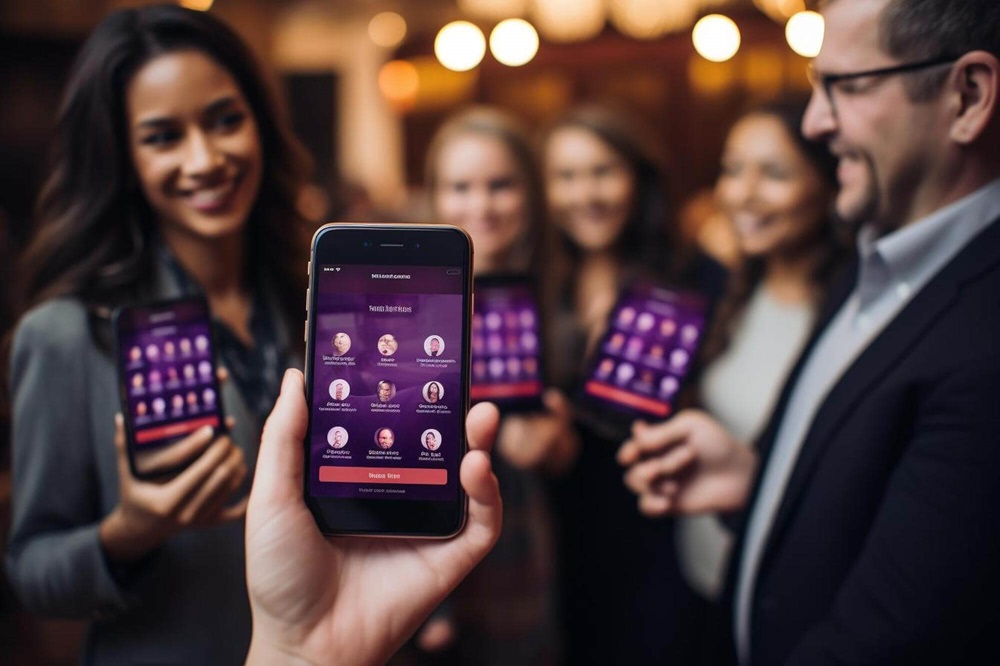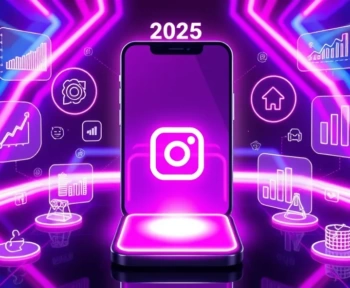With time moving in fast-forward mode, mobile apps for events have gone beyond expectations in the event management arena. Time and time again their use cases have proven to skyrocket the total event experience for attendees and reduce the load of event-related tasks for organizers all at the same time. These mobile apps for conferences achieve this by simplifying many of the crucial event management procedures and boosting activity.
In this article, we will be going through the best of the best mobile apps for events and conferences of 2025. You will understand these top event management apps in-depth by learning about their key features, pros, and cons. Additionally, we will also go through the exact role of mobile apps in event management.
Table of Contents
Purpose Of Mobile Apps For Events And Conferences
The reason mobile apps for events were constructed was to handle and smoothen the processes of event management for organizers and also take into account the engagement levels of attendees, let’s go further:

Boosting Attendee Engagement
Mobile apps for conferences form the quickest communication line between event organizers and their participants, making sure and allowing for prompt updates on any changes or updates regarding the event programs. This kind of communication channel promises that attendees will always remain up to date regarding the event which translates to less confusion and better experiences.
Features:
- Live polling: Attendees can take part in live polls conducted in the middle or after the sessions, which allows for the transfer of instant feedback to speakers and organizers. This doesn’t just boost engagement but also allows presenters to customize their content according to audience input.
- Q&A sessions: Mobile apps for events and conferences offer interactive Q&A periods where attendees can submit questions in real-time and get answers to them as well during an event. This promotes participation and makes sessions more interactive and less boring, as speakers can address audience concerns directly.
- Networking tools: This feature is about getting or initiating the attendee to connect with another attendee. Viewing attendee bios, both one-to-one messaging and group chats, contact exchanges, etc. are some of the features of the top event management apps that promote networking and bonding between participants of an event.
Simplifying Event Management
One great thing about mobile apps for events is that they constitute and cater to a variety of event-related tasks into one single platform or application. Some of these tasks include: registration; ticketing; scheduling; and analytics, all of which help or ease the management of the logistical aspect of an event. Let’s have a look at some of these tools:
Tools:
- Agenda management: This feature is attendee-oriented and allows for the creation of customized agendas based on their preference of programs or sessions they would want to attend or not miss out on. Once they form this, mobile apps for conferences send reminders and updates on session timings so that attendees don’t miss the sessions they wish to be a part of.
- Contactless check-in: Mobile apps for events and conferences also take care of event check-in processes through the use of modern digital tickets or QR codes, which significantly boosts efficiency while nullifying physical contact—a preference many individuals take heed of in the present era.
- Real-time analytics: This feature is specifically dedicated to event organizers who consider gathering insights and obtaining data extremely crucial to knowing the progress and measuring the success of their event planning. Top event management apps help in this venture by providing real-time data on attendees and their interaction with an event.
Top 21 Mobile Apps for Events and Conferences In 2025
Now that we have understood the role of mobile apps for events, we are going to cover the best of the best mobile applications for events and conferences in 2025 that help in managing event logistics and provide positive experiences:
1. Dreamcast
Dreamcast has a top-tier mobile app for conferences which is carefully designed to handle multiple parts of event management processes. This includes: registration; check-in and badges; networking; access control, and much more.
Key features:
- Customizable registration pages- Organizers can create their registration pages with multi-tier ticketing options to take heed of different audience segments.
- AI-powered networking suggestions- The app also includes AI capabilities that provide the most suitable recommendations for connections based on attendee details and miscellaneous factors.
- Gamification components- Elements like leaderboards and challenges raise attendee participation and engagement during an event.
- Secure payment integration- It also takes care of smooth transactions with secure payment gateways, promising a hassle-free registration process for both attendees and organizers.
2. Whova
Whova is more on the popular side of mobile apps for events and conferences, which is known for its user-friendly interface and tight features that work for attendee engagement and networking.
Key features:
- Community board- Attendees can share insights, ask questions, and network before and during the event.
- Personalized agendas- Users can customize their schedules and receive real-time notifications about session changes.
- Live polling and Q&A- Facilitates audience interaction during sessions.
| Pros | Cons |
| Intuitive design that simplifies event management. | Limited customization options for branding. |
| Strong community-building features. |
3. Cvent
Cvent is an all-in-one event application that proudly presents itself among the top event management apps making it ideal for large-scale conferences, offering extensive tools for planning and execution.
Key features:
- Comprehensive event management tools- From registration to analytics, Cvent covers all aspects of event planning.
- On-site solutions- Includes check-in kiosks and badge printing.
| Pros | Cons |
| Highly customizable with robust reporting features. | Can be complex for smaller events due to its extensive features. |
4. Attendify
Attendify focuses on enhancing attendee engagement through its interactive features and user-friendly design making it secure in this position as one of the top mobile apps for events.
Key features:
- Event app customization- Organizers can create a branded app customized to their specific needs.
- Social media inclusion- Attendees can share their experiences on social media directly from the app.
| Pros | Cons |
| Easy to use with strong engagement tools. | Limited analytics compared to competitors. |
5. InEvent
InEvent is one of the top mobile apps for conferences, that is specifically designed for corporate events, offering personalized experiences through customized content delivery.
Key features:
- Customizable event apps- Permits organizers to create apps that reflect their branding.
- Interactive features for activity- Includes live polling and feedback tools.
| Pros | Cons |
| Excellent analytics capabilities for assessing event success. | May require additional training for first-time users. |
6. Eventzilla
Eventzilla caters to a wide range of events, offering flexibility in ticketing and registration processes. This positions it in the group of top-tier mobile apps for events and conferences.
Key features:
- Diversified ticketing options- Organizers can create various ticket types easily.
- Real-time analytics dashboard- Provides instant updates on registrations and engagement metrics.
| Pros | Cons |
| User-friendly design with effective marketing tools. | Some advanced features may require extra fees. |
7. EventMobi
EventMobi is known for its versatility in supporting both in-person and virtual events while emphasizing attendee engagement making it one of the top event management apps out there.
Key features:
- Hybrid event support- Seamlessly integrates both in-person and virtual attendees.
- Live engagement tools, such as polls and Q&A sessions.
| Pros | Cons |
| Comprehensive reporting capabilities for data-driven decisions. | Pricing may be higher for smaller events. |
8. Guidebook
Guidebook is a versatile mobile app for events designed to enhance the attendee experience through customizable content and real-time updates.
Key Features:
- Customizable event guides– Organizers can create detailed event guides that include schedules, speaker bios, and venue maps.
- Actionable features- Attendees can engage with live polls, Q&A sessions, and social media integration.
| Pros | Cons |
| Easy to navigate for attendees. | Some users report limited customer support during peak times. |
| Strong customization options for branding. |
9. Airmeet
Airmeet is a virtual event platform that focuses on formulating immersive online experiences, making it one of the perfect mobile apps for conferences, especially for hybrid events.
Key features:
- Virtual networking tables- Attendees can join themed tables to discuss topics of interest, fostering organic networking.
- Interactive sessions- Features like live Q&A and polls keep participants engaged throughout the event.
| Pros | Cons |
| Excellent for hybrid events with a strong focus on networking. | Limited features for fully in-person events. |
| Intuitive interface for both organizers and attendees. |
10. Bizzabo
Bizzabo is an all-in-one event management platform that emphasizes attendee engagement and analytics.
Key features:
- Personalized agendas- Attendees can create custom schedules based on their interests.
- Data analytics dashboard- Offers insights into attendee behavior and engagement metrics.
| Pros | Cons |
| Strong focus on data-driven decision-making. | Pricing may be higher compared to simpler apps. |
| Comprehensive marketing tools to promote events. |
11. vFairs
vFairs specializes in virtual and hybrid events, offering a platform that mimics in-person experiences online.
Key features:
- Virtual exhibit halls– Attendees can explore booths and interact with exhibitors in a virtual environment.
- Gamification elements- Includes leaderboards and challenges to encourage participation.
| Pros | Cons |
| Highly customizable virtual environments. | Can be complex to set up initially. |
| Strong support for exhibitors and sponsors. |
12. SpotMe
SpotMe is designed for corporate events, focusing on personalized attendee experiences and engagement.
Key features:
- Personalized content delivery- Generates content based on attendee preferences and behavior.
- Interactive features like live polling and Q&A Sessions, raise audience participation.
| Pros | Cons |
| Excellent integration with CRM systems for targeted marketing. | Higher costs may not be justified for smaller events. |
| Strong analytics capabilities for post-event evaluation. |
13. Hopin
Hopin is a leading platform for virtual events, offering tools to create immersive online experiences that replicate in-person interactions.
Key features:
- Multi-stage events- Organizers can host multiple sessions simultaneously, allowing attendees to choose their preferred content.
- Networking opportunities- Attendees can meet one-on-one or in small groups through video chats, fostering connections.
| Pros | Cons |
| Robust features for virtual networking. | Performance issues were reported during high-attendance events. |
| User-friendly interface that simplifies navigation. |
14. Brella
Brella focuses on networking by providing tools that facilitate meaningful connections among attendees before, during, and after events.
Key features:
- AI-powered matchmaking- Suggests potential connections based on interests and professional backgrounds.
- Meeting scheduling- Attendees can schedule meetings directly through the app, enhancing networking efficiency.
| Pros | Cons |
| Strong emphasis on networking opportunities. | Limited features for event management beyond networking. |
| Intuitive design that encourages user engagement. |
15. PheedLoop
PheedLoop offers comprehensive solutions for both in-person and virtual events, focusing on attendee engagement and ease of use.
Key features:
- Integrated event management tools– Covers registration, ticketing, and attendee tracking all in one platform.
- Engagement tools- Includes live polls, Q&A sessions, and gamification features to boost participation.
| Pros | Cons |
| Flexible pricing options suitable for various event sizes. | Some users find the interface less intuitive compared to competitors. |
| A strong customer support team is available during events. |
16. Swoogo
Swoogo is an event management platform known for its powerful registration tools and user-friendly design.
Key features:
- Customizable registration forms- Organizers can create tailored registration experiences with ease.
- Real-time reporting– Provides insights into registration trends and attendee demographics instantly.
| Pros | Cons |
| A simple setup process with a minimal learning curve. | Limited marketing features compared to other platforms. |
| Good integration options with other software tools. |
17. Social Tables
Social Tables specializes in event seating arrangements and floor planning, making it easier to manage logistics for large gatherings.
Key features:
- Interactive floor plans- Organizers can create detailed seating charts that attendees can view before the event.
- Guest management tools- Facilitates check-in processes and guest tracking during the event.
| Pros | Cons |
| Excellent tool for managing complex seating arrangements. | Primarily focused on logistics rather than overall event management features. |
| A User-friendly interface simplifies planning tasks. |
18. MeetingPlay
MeetingPlay offers solutions tailored specifically for corporate meetings and conferences, focusing on personalization and engagement.
Key features:
- Custom event apps– Allows organizers to create branded apps that reflect their organization’s identity.
- Engagement metrics tracking- Provides detailed analytics on attendee interactions during the event.
| Pros | Cons |
| Strong focus on corporate needs with tailored solutions. | May lack features needed for larger public events or festivals. |
| Good customer support throughout the planning process. |
19. Eventbrite
Eventbrite is a well-known platform that simplifies ticketing and registration for various types of events, from concerts to conferences.
Key features:
- Easy ticketing solutions- Organizers can set up ticket sales quickly with various pricing options.
- Promotional tools- Offers marketing features to help promote events effectively through social media integrations.
| Pros | Cons |
| Established as a brand with a user-friendly interface. Extensive reach due to its popularity among attendees searching for events. | Transaction fees can add up depending on ticket sales volume. |
20. Zoom Events
Zoom Events builds upon the popular Zoom platform by providing specific features for hosting virtual conferences and webinars effortlessly online.
Key features:
- Multi-session capabilities- Hosts can run multiple sessions at the same moment while also providing breakout rooms effectively.
- Integration with Zoom meetings/webinars- Utilizes existing Zoom functionalities while adding new features specific to events that are being hosted through it.
| Pros | Cons |
| The familiar interface makes it easy for users already accustomed to Zoom. | Limited customization options compared to dedicated event apps focused solely on conferences or expos. |
| High-quality video conferencing capabilities provide smooth and convenient sessions. |
21. Hopin Virtual Expo
Hopin Virtual Expo is an extension of the Hopin platform made especially for hosting large-scale virtual expos or trade shows digitally.
Key features:
- Exhibit halls & booths- Virtual exhibit spaces where sponsors can display their products/services just like in an on-site event.
- Networking lounges- Dedicated areas where attendees can take part in discussions or casual conversations with others interested in topics of interest.
| Pros | Cons |
| Excellent tools for exhibitors looking to maximize visibility at virtual events. | Can be overwhelming due to the extensive features available; may require training for optimal use. |
| Appealing user experience encourages attendee participation throughout the expo. |
Conclusion
Moving forward in 2025, one thing is clear and certain, planning and executing events without the use of mobile apps for conferences is a step towards loss and trouble. When organizers have complete autonomy over their event’s critical points then the event experiences for the attendees are truly magnified. This is only possible when the processes related to logistics and management are automated using mobile apps for events.
So if you are an event organizer looking for a mobile event app to help and better your event planning, then the above top event management apps of 2025 should be your go-to choice.




